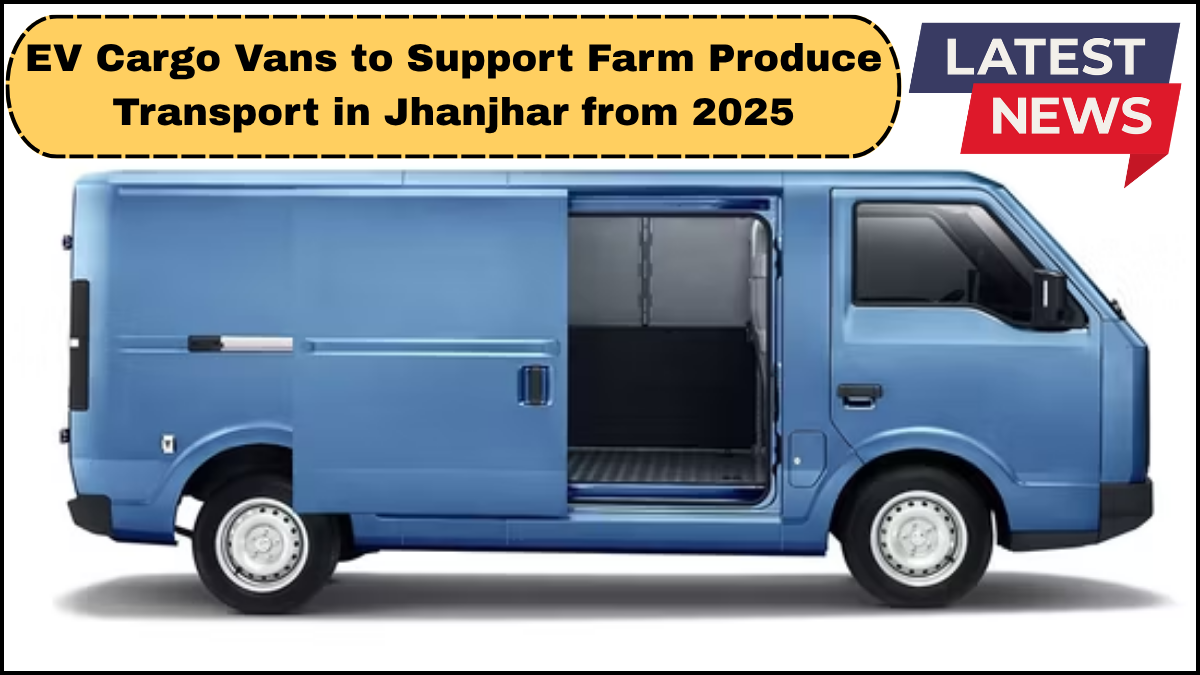As India pushes forward with its sustainable transportation goals, Jhanjhar is gearing up for a quiet revolution in rural logistics. Beginning in 2025, EV cargo vans will be introduced to streamline the transport of farm produce in this agricultural belt—ushering in a cleaner, more efficient supply chain. Backed by policy support and local innovation, this move reflects a broader push by Green Village Logistics India and allied stakeholders to modernize rural delivery systems using electric mobility.

The Need for Change in Rural Transport
For decades, farmers in Jhanjhar have relied on diesel-powered trucks and tractors to carry produce to nearby mandis and distribution centers. These traditional methods come with a host of problems—rising fuel costs, frequent mechanical breakdowns, and heavy carbon emissions, not to mention delays caused by poorly maintained roads. With farm yields increasing due to better irrigation and farming techniques, the limitations of current transport models are becoming more apparent.
In short, the existing logistics infrastructure is neither scalable nor sustainable. That’s where EV cargo vans in rural delivery come into play.
How EV Cargo Vans Will Make a Difference
Electric cargo vans bring multiple advantages, especially in agricultural contexts:
-
Lower Operational Costs: EVs eliminate fuel expenses, and their maintenance requirements are significantly lower. For farmers and small logistics operators, this translates to long-term savings.
-
Zero Emissions: With increasing awareness about environmental degradation, the shift to electric vans supports India’s goal of reducing its carbon footprint, particularly in rural zones where diesel fumes still dominate.
-
Reliable and Efficient: Modern EVs can handle moderate payloads and navigate rural roads more efficiently than bulky tractors or outdated trucks.
-
Digital Integration: EV cargo vans come equipped with GPS tracking, route optimization, and telematics, allowing farmers to coordinate deliveries better and minimize waste due to spoilage or late arrivals.
-
Battery Swapping Models: In regions where charging infrastructure is still catching up, battery swapping stations—especially mobile ones—will ensure minimal downtime for electric vans.
Pilot Projects and Infrastructure Rollout
Green Village Logistics India, a startup focused on building sustainable transport models in rural areas, has already begun setting up the groundwork in Jhanjhar. Charging stations are being installed at key collection points and cooperative storage units. Pilot tests with small-scale EV vans have shown promising results—faster deliveries, reduced spoilage, and positive feedback from farmers.
In partnership with local authorities, Green Village Logistics India is also conducting workshops to train farmers and drivers in handling electric vehicles, managing charging cycles, and utilizing digital platforms for route planning.
Empowering Small Farmers Through Better Access
By 2025, EV cargo vans are expected to cover 100+ villages across the Jhanjhar district, creating a more reliable logistics network. For small farmers, this means they can sell directly to markets without being at the mercy of middlemen or unreliable transport. Improved delivery times also open doors to perishable markets, such as dairy and leafy vegetables, where freshness is a selling point.
Moreover, access to green logistics makes their produce more attractive to eco-conscious buyers, both in urban centers and export markets.
Addressing Infrastructure Challenges
While the initiative is ambitious, it’s not without hurdles. Rural electrification still needs reinforcement in some pockets, and consistent charging infrastructure is critical. However, through a mix of government grants, private investment, and public-private partnerships, these challenges are being addressed progressively.
Jhanjhar is likely to serve as a blueprint for similar districts looking to modernize their farm-to-market logistics sustainably.
FAQs
Q1: What makes EV cargo vans suitable for rural delivery in India?
EV cargo vans offer lower operational costs, zero emissions, and reliable performance even on uneven rural roads. Their integration with digital logistics systems also improves supply chain transparency.
Q2: Who is leading the implementation of EV cargo vans in Jhanjhar?
The initiative is spearheaded by Green Village Logistics India, in collaboration with local panchayats, farmer cooperatives, and state authorities.
Q3: How will farmers benefit from the shift to EV vans?
Farmers will see reduced transport costs, faster access to markets, less spoilage of perishable goods, and better profit margins.
Q4: What about charging infrastructure in rural areas?
Charging stations and battery swapping points are being strategically deployed at farm hubs and market access nodes to ensure minimal disruption.
Q5: Is this model being replicated elsewhere?
Yes, if successful, the Jhanjhar model is expected to be adapted in other agricultural districts as part of India’s rural electrification and sustainable transport roadmap.
click here to learn more